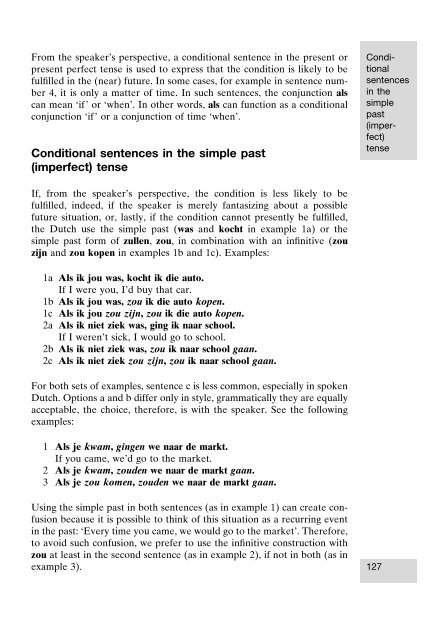er - Home
er - Home
er - Home
You also want an ePaper? Increase the reach of your titles
YUMPU automatically turns print PDFs into web optimized ePapers that Google loves.
From the speak<strong>er</strong>’s p<strong>er</strong>spective, a conditional sentence in the present or<br />
present p<strong>er</strong>fect tense is used to express that the condition is likely to be<br />
fulfilled in the (near) future. In some cases, for example in sentence numb<strong>er</strong><br />
4, it is only a matt<strong>er</strong> of time. In such sentences, the conjunction als<br />
can mean ‘if’ or ‘when’. In oth<strong>er</strong> words, als can function as a conditional<br />
conjunction ‘if’ or a conjunction of time ‘when’.<br />
Conditional sentences in the simple past<br />
(imp<strong>er</strong>fect) tense<br />
If, from the speak<strong>er</strong>’s p<strong>er</strong>spective, the condition is less likely to be<br />
fulfilled, indeed, if the speak<strong>er</strong> is m<strong>er</strong>ely fantasizing about a possible<br />
future situation, or, lastly, if the condition cannot presently be fulfilled,<br />
the Dutch use the simple past (was and kocht in example 1a) or the<br />
simple past form of zullen, zou, in combination with an infinitive (zou<br />
zijn and zou kopen in examples 1b and 1c). Examples:<br />
1a Als ik jou was, kocht ik die auto.<br />
If I w<strong>er</strong>e you, I’d buy that car.<br />
1b Als ik jou was, zou ik die auto kopen.<br />
1c Als ik jou zou zijn, zou ik die auto kopen.<br />
2a Als ik niet ziek was, ging ik naar school.<br />
If I w<strong>er</strong>en’t sick, I would go to school.<br />
2b Als ik niet ziek was, zou ik naar school gaan.<br />
2c Als ik niet ziek zou zijn, zou ik naar school gaan.<br />
For both sets of examples, sentence c is less common, especially in spoken<br />
Dutch. Options a and b diff<strong>er</strong> only in style, grammatically they are equally<br />
acceptable, the choice, th<strong>er</strong>efore, is with the speak<strong>er</strong>. See the following<br />
examples:<br />
1 Als je kwam, gingen we naar de markt.<br />
If you came, we’d go to the market.<br />
2 Als je kwam, zouden we naar de markt gaan.<br />
3 Als je zou komen, zouden we naar de markt gaan.<br />
Using the simple past in both sentences (as in example 1) can create confusion<br />
because it is possible to think of this situation as a recurring event<br />
in the past: ‘Ev<strong>er</strong>y time you came, we would go to the market’. Th<strong>er</strong>efore,<br />
to avoid such confusion, we pref<strong>er</strong> to use the infinitive construction with<br />
zou at least in the second sentence (as in example 2), if not in both (as in<br />
example 3).<br />
Conditional<br />
sentences<br />
in the<br />
simple<br />
past<br />
(imp<strong>er</strong>fect)<br />
tense<br />
127


